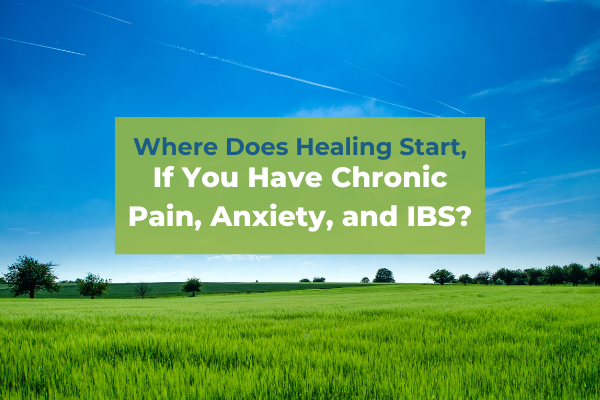Summary:
One of my readers asked a great question: “Doc, what are your thoughts about EBV and Herpes as causes of fibromyalgia? And what about bio-film and leaky gut? I have bad IBS, and always feel so tired. Oh, and I also have bipolar, PTSD, and panic attacks due to trauma and abuse”.How does someone start to heal if there is so much going on?
It’s important to remember that many chronic pain and illness syndromes share underlying biological imbalances. If you can start to identify those issues, you can understand what is driving your symptoms. And that can help clarify your path to healing. At the core of almost every chronic pain and illness syndrome is the intimate relationship among the gut, the immune system, and the brain. Gut-brain-immune interactions are showing up in chronic illnesses including autoimmune disease, fibromyalgia, dementia, neuro-degeneration, arthritis, neuropathy, and more. It might be decades before the research is organized into treatment that the average family doctor will offer. In the meantime, many people benefit from safe lifestyle approaches that address the underlying causes of chronic pain and illness. And that often helps people heal, feel better, and live better. It’s helpful to think through the history of early life experiences, illness, triggers, and what issues are most prominent in life now. And to start to understand how these things interact. The reader who shared this question was asking about everything BUT her ongoing anxiety and panic, related to her history of emotional and physical abuse. It’s a shame, because those issues can heal. And then the person can heal. And the person usually doesn’t heal the physical illness if they don’t heal the toxic shame, self-blame, anxiety, and hypervigilance that often develops after such tragic events. So many folks with anxiety and chronic illness have been stigmatized with ‘it’s all in your head”, when really they have significant biological issues. The sad thing is many docs don’t seem to “get it”, even though the research shows the issues quite clearly. And unfortunately, that’s triple-bad for patients. They don’t get their needs met. They get blamed and shamed for their illness, which often makes them worse. And the stigma often creates an obstacle to recognizing the mind-body relationships that are driving the physical illness. The patients continue to suffer because they are unwilling to do the crucial mind-body healing work, which is a foundation of healing and recovery. Chronic pain and illness mean that your actual physiology is in “protective mode”. If you have anxiety, panic, depression, history of trauma, then that protective mode is amplified intensely. It’s incredibly important to develop the power of your mind and heart to shift the patterns that create disease. And to create a sense of safety, acceptance and compassion, and to get it “into your bones”. Once you learn these tools and make them real in your life, amazing things can happen. Scroll down for full transcriptDid You Know:
Dr Shiller gives regular free mind-body training sessions on zoom. You can get the schedule and register at www.mindbodygroove.comYou can learn more about Dr Shiller’s practice and schedule a telemedicine or in-person consultation at www.drshiller.com
Join the email-community to receive reliable, MD-reviewed information, inspiration, and guidance to help you Reclaim Your Life From Unresolved Pain and Chronic Illness http://bit.ly/3aOrrsQ
Inner Healing Essentials is an intensive six-week course taught by Dr Shiller, which teaches you the Six Steps To Inner Healing. It empowers you to transform stress into vitality, and begin to take back your life from chronic pain and illness. A new class begins quarterly. To get more info and be notified of the next start date: https://andrew-david-shiller.mykajabi.com/inner-healing-essentials-waitlist.
Related Posts:
- https://www.drshiller.com/interview-ldn-pain-auto-immunity/
- https://www.drshiller.com/healing-chronic-pain-illness-ldn-low-dose-naltrexone-part-1/
- https://www.drshiller.com/dont-miss-these-3-things-that-can-prevent-healing-from-ibs-fatigue-and-chronic-pain-part-3a/
- https://www.drshiller.com/dont-miss-these-3-things-that-can-prevent-healing-from-ibs-fatigue-and-chronic-pain-pt-3b/
- https://www.drshiller.com/healing-neuropathy-ldn-functional-medicine/

